British quartets have often distinguished themselves in this prestigious triennial competition. The Endellion Quartet was the second prize-winner in 1979, the Vanbrugh Quartet won in 1988, the Vellingers in 1994 and the Belcea Quartet took third prize in 1997. This year there were 18 string quartets competing (five groups had dropped out because of injury, funding problems etc.) but there was no entrant from the host country. Everyone wondered why? Pusillanimity was suggested as a likely explanation - to enter and not succeed might do their future careers no favours. The entrants for this millennial competition ranged from world class established professionals (their ages must not total over 120) to other groups which were young and relatively immature musically - and technically too; at least one quartet sounding incapable of having produced a requisite tape good enough to qualify for entrance!During the finals, I sat next to the cellist of one of Britain's most highly regarded quartets; she told me she had never entered a competition! Some of these London competitors cited several previous competition triumphs, and one wondered why they felt the need to go on collecting trophies. Competitions are an integral part of contemporary musical life, offering challenging experience to younger musicians and steady employment as peripatetic judges for those of their seniors who can afford the time. The same controversies about their value, inevitability and demerits rage every time.
The national emphasis, with each judge sitting behind a small flag, gives out a regrettable (for some distasteful) message. Musical performance can transcend national barriers; the only competition should be to serve the music itself, not to beat other nations. A cause for regret in the London arrangements was that free lodging and meals for competitors from abroad remained available for only one night after elimination. Many quartets are likely to be far from well off and no doubt departed forthwith the next day.
Some competitions foster group solidarity between participants, and enhance learning potential, by encouraging all to stay until the end, and by offering advice on repertoire and future career plans - it is not clear whether any of that still applies in this competition? The last two London ISQ competitions, in 1994 & 1997, ended with splendid gala concerts at the Barbican involving everyone, but this feature was cut out this year, as were some of the venues for prize-winners' recitals. Blackheath (where S&H is based) has in the past enjoyed welcoming the second prize winners for memorable music making, freed from competitive stress.
The London competition is a six-day marathon, its final afternoon coinciding this year with the London Marathon, its competitors simultaneously running through the City of London close by Goldsmiths' Hall. This musical marathon was likewise exhausting for participants, listeners and, no doubt, for the judges who hear everything. Everyone had to play Mozart and Haydn, and the finals are traditionally given to Beethoven (excluding his Op.18). Each quartet had to study a new quartet, specially commissioned from Anthony Powers, even if they were eliminated before their time to play it.There was a range of 19th C. romantic and 20th C options, but most of the competitors avoided the more radical choices. Few excelled in all departments and, from my five-day samplings of at least one of the several sessions, I formed a tentative view that this year's was not a vintage crop of string quartets - apologies to all those that I was unable to hear - and that there are many young quartets hereabouts that would not have disgraced themselves by taking part. Several came to grief in standard works by Brahms and Ravel and, in the finals, Beethoven.
The competitors were supplied with the Powers No. 3 on the Monday evening and had to have it ready by Friday. It is a ten minute single movement, according to the composer 'about song and dance', which integrates smoothly numerous advanced playing techniques (not long since regarded as mere decorative frippery, e.g. by Robert Simpson, whose Quartet No. 6, an earnest reworking of Beethoven Op. 59/3, was the centre-piece of a Wigmore Hall recital during the competition, in which the Vellinger Quartet demonstrated in Haydn Op. 55/2 and the Op. 59/3 itself that they are still a world class ensemble, six years on). The Powers piece is rhythmically intricate, by turns virtuosic and witty, and expressive too in the melodic central section - a good test of musicianship and rapid learning, and a welcome concert item that should have a good future life after its nine first performances. Its clearly differentiated sections move from preciso, secco, meccanico via sostenuto, cantabile to animato, energico, giocoso. Most of them coped impressively, a cause for wonderment indeed, though some of the players were too dour and missed the humour.
Some of the most pleasurable experiences were in the first stage, before cumulative tension and tiredness began to take its toll. Of the thirteen eventually eliminated, some wonderful performances remain in the memory. The young Tempera Quartet of Finland, which has studied at the Royal College of Music in London, showed great promise in Mozart and Shostakovich No. 10 in which, after a restrained opening, they unleashed unexpected force in the furioso movement, followed by rapt pianissimo in the adagio. The American Coolidges persuaded the sceptical that Schoenberg No. 3 is real, communicative music. The French Quatuor Diotima drew the audience in with their gentle and sympathetic performance of Schumann's Op. 41/3, and they gained the award for the best performance of the Powers quartet. All these can confidently be recommended to chamber music societies for future booking.
During the semi-finals the hotly-tipped Amar Quartet from Switzerland was unable to find the right idiom to make sense of the Verdi quartet - a risky choice because it depends on flair and style to bring it off convincingly; nonetheless they won the prize for the most promising quartet not to gain a major award. The Polish Karol Szymanowski Quartet achieved a far more exciting Verdi performance, but did not get through to the finals - there had been murmurings amongst the cognoscenti that they were insufficiently Italianate in this notoriously tricky piece. To my ears, they had played it with intensity and commitment, and as chamber music by an opera composer, and had followed a splendid performance of the Powers, one of the few to make its final page work - the jazzy violin part is apt to get submerged.The French Quatuor Renoir (5th Prize) started the Saturday morning with an involving account of Janacek No. 1, which helped them through to the finals, where they let themselves down with an unsuccessful attempt to persuade us that Beethoven's Op. 74
is in the same class as his other mid- and late quartets. The Japanese Quartetto Armonico had given a fine account of Mozart K421, feeling the ebb and flow of the music with their whole bodies, and followed it with a superb Ligeti No. 2. They were badly advised to essay Beethoven Op. 130 in the finals and, worse, to have the temerity to add the Grosse Fuge Op. 133 for good measure after we had been listening to Beethoven for some four hours, notwithstanding which they gained second prize of £5,600 and a UK Tour.
As in previous London competitions, I have reservations about the format and particularly the Beethoven finals, which are costly to attend and always over- subscribed - there appeared to be a risk that we were in for a series of Op. 59/2s, a favourite choice. In the event, it was played only once and helped to secure the first prize of £8000 plus a UK and European Tour for the Casals Quartet of Spain, who had not figured in my personal ratings (it must never be forgotten that in this competition, as with many others, the marking is cumulative through all the stages, and I had not heard them before the finals). I was interested to read in the programme book that there has to be a detailed marking scheme with no discussion or disagreement in the jury room, so as to avoid undue influence by strong personalities.
The final session lasted some 4½ hours, and for listeners did not make for a good concert. By the end it was hard to enter fully into the mood of Beethoven's heavenly-long Heiliger Dankgesang from Op. 132 played, for the second time that afternoon, by the Romanian Contempo Quartet who had begun in a style too legato for my taste, with the parts insufficiently differentiated. However, they improved as they continued, and were more relaxed by the time that they (and we!) reached the Allegro appassionato home straight, winning themselves the Third Prize (£4000 and a UK tour) plus the Audience Prize of £1000.
I had preferred the earlier performance of Op. 132 by the Quatuor Psophos, one of several French contenders, who gained my attention with their non-vibrato commencement, and held it with their meticulous attention to clarifying the texture throughout, securing my own Audience Prize vote and, far more importantly, the £2,800 fourth prize. I hope they will return to London and that readers will seek out the numerous scheduled performances by the first, second and third prizewinners in many parts of the UK - details from manygate@easynet.co.uk and the London International String Quartet Competition's website http://lsqf.com/
Peter Grahame Woolf
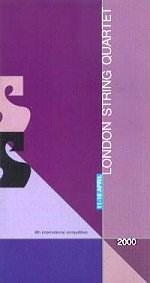
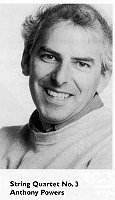
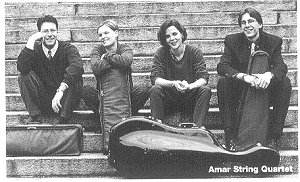
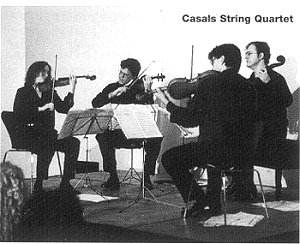
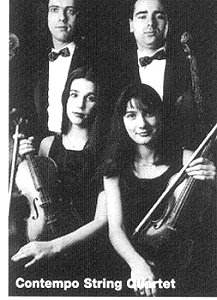
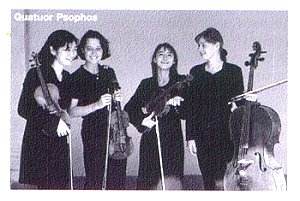
 Return to:
Return to: